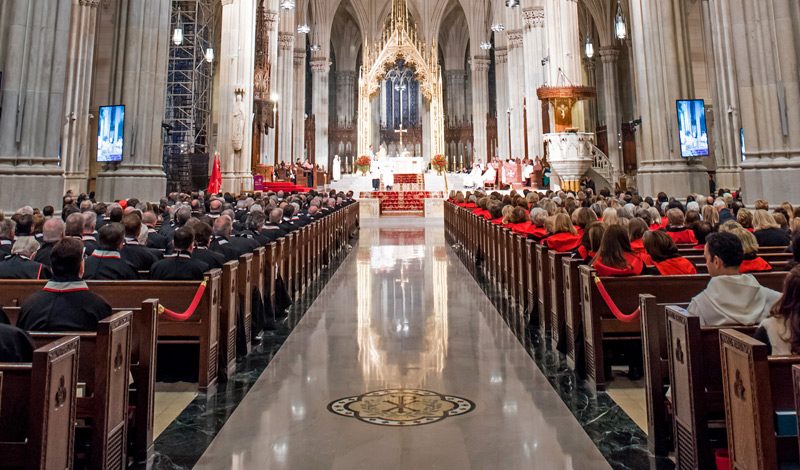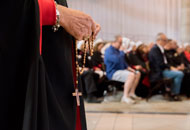Helping Us to Journey As “Pilgrims Of Hope”
This reflection was written by Very Rev. Msgr. Anthony M. Barratt, STL, PhD, EV, ChM.
As the Gospel for Ash Wednesday reminds us (Matthew 6: 1-6, 16-18), during the season of Lent, we are invited to intensify our efforts in three, crucial areas of our discipleship: fasting, prayer and acts of charity. In many ways, these are the three pillars of Lent. We should also note that we are called to live not just one, or even two of them, but all three! It is not that we do not live these throughout the rest of the year (well, hopefully), but in the season of Lent we renew, refresh and strengthen them. All three pillars are very familiar to us as members of the Order. After all, they are at the very heart of who we are and what we do. In our 2025 Jubilee Year, we can also see how these three pillars not only help us journey well through Lent as members of the Order, but also to journey fruitfully as “pilgrims of hope.” Here are a few thoughts or suggestions for doing just that:
FASTING:
Fasting has a long pedigree in our faith. In the Old Testament, fasting was a common action both of individuals and of the whole community. Sometimes a fast was proclaimed as a sign of repentance, or as an invitation for the people to renew and refocus their relationship with God. At other times, fasting was part of the preparation for a major task or project, especially a difficult or frightening one, or as a form of clearing the mind and heart to receive a revelation or mission from God. Of course, Jesus himself fasted as we hear, for example, in the Gospel for the First Sunday in Lent (during his temptations in the desert).
Fasting can take many forms. There is the obvious way of fasting: of not eating certain foods or not eating at certain times. But fasting can also occur in other ways. We could, for example, try fasting from the computer, or the ever-present and life-dominating smart phone. We could also fast from negative things such as gossip, envy, anger, being judgmental etc. It is worth recalling that fasting is, in a way, a means to an end. We fast so as to remember that we should not have our lives controlled by certain things or appetites. It also helps us to be mindful of those who do not have even the basic necessities of life. Furthermore, fasting is a great reminder that all we have and are is not actually ours; but rather that it is a gift from God.
Of course, for Catholics, Ash Wednesday and Good Friday are obligatory days of fasting and abstinence. In addition, Fridays during Lent are obligatory days of abstinence in the dioceses of the USA. According to Church Law, all Catholics ages 18 until 59 are obliged to fast. Fasting is taken to mean having one full meal; as well as two small meals (that together are not equal to a full meal). The norms of abstinence from meat are binding for Catholics ages 14 and up.
PRAYER:
Lent is a time when we can focus or refocus on prayer. Hopefully, we do take time to pray. After all, it is so essential for us. We are made to pray! If we do not eat properly or keep hydrated, then our bodies soon get sick and decline. So too with prayer. If we do not pray, then our spirit quickly gets sick and withers, and our relationship with God fades away. Prayer is not always easy, but we should not think that we cannot pray. Saint Francis de Sales famously wrote that everyone can pray, because, he said, “so long as they are capable of grace, they are also capable of prayer.” He went on to say, “it is only the devil who is incapable of prayer, because he alone is incapable of love.” Certainly, we cannot be pilgrims of hope without being pilgrims of prayer!
In Luke, Chapter 18, Jesus gives us some wonderful lessons about prayer, especially being persistent in our prayers and also of having the right attitude or disposition for prayer. Perhaps we could spend some extra time this Lent in saying the Daily prayer of the Order and reflecting upon it. A particular book that I would recommend is 33 Days to Eucharistic Glory. It is a series of short, daily meditations on the Eucharist: rather like a mini-retreat.
ACTS OF CHARITY:
Almsgiving or acts of charity are, of course, very much part of the purpose and mission of the Order. However, Lent can remind us that they should not be some sort of grudging duty, or a guilty response to someone in need. It is rather something that must be a core part of us as disciples of the Lord (or pilgrims of hope!), and therefore a way in which we truly try to imitate him. As Pope Benedict XVI has noted: “Almsgiving according to the Gospel, is not mere philanthropy; rather it is a concrete expression of charity, a theological virtue that demands interior conversion to love of God and neighbor, in imitation of Jesus Christ, who, dying on the cross, gave his entire self to us.”
Acts of charity are also intimately bound up with mercy. “Mercy is the showpiece of the soul” St. Augustine reminds us; but how can we be merciful? Mercy is a very practical and real thing and not just some nice concept or idea. There are so many ways that we can respond to the mercy that we have received by showing mercy to others. In our Christian tradition there are two main ways that we can do this: what are called the corporal and the spiritual works of mercy (they are based on the Final Judgment in Mathew’s Gospel, chapter 25: “Lord, when did we see you…?”). The corporal works of mercy are: feeding the hungry, giving drink to the thirsty, clothing the naked, sheltering the homeless, visiting the sick, ransoming captives (think of human trafficking for example) and burying the dead. The spiritual works of mercy are: instructing the ignorant, counseling the doubtful, comforting the sorrowful, admonishing the sinner, gladly forgiving injuries, bearing wrongs patiently and praying for living and the dead.
Acts of charity can be wonderful ways of being pilgrims of hope, by bringing hope and comfort to those in need.
May this Lent be for all of us, a time of true transfiguration and transformation!




